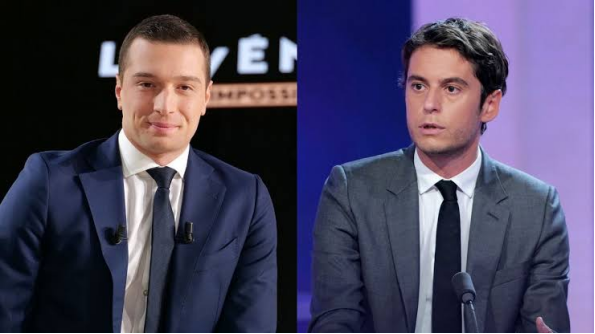
Prime Minister Gabriel Attal Makes Final Plea to Voters to Prevent Thwart Far-Right Victory in France Amid Growing Racism Concerns
By Fiona Nanna, ForeMedia News
4 minutes read. Updated 4:00PM GMT Sat, 29, 2024
In a high-stakes political drama unfolding in France, Prime Minister Gabriel Attal has made a fervent final appeal to voters in a bid to prevent a historic parliamentary victory by the far-right National Rally party. The brief yet intense election campaign has electrified the nation, with many French citizens bracing for potentially significant political shifts.
Prime Minister Attal warned that a victory for the National Rally could trigger “impulses of hate and aggression,” a stark statement reflecting the deep divisions in French society. Despite these appeals, the party, led by Marine Le Pen and the youthful Jordan Bardella, remains firmly ahead in opinion polls, with Bardella possibly becoming the next Prime Minister.
National Rally’s Ascendancy
The National Rally, formerly known as the National Front, has faced numerous accusations of racism, involving both party members and supporters. Nevertheless, it has managed to consolidate its lead. The pivotal question now is whether the party can secure an absolute majority in the upcoming two rounds of voting over the next two Sundays.
The European elections on June 9 served as a critical moment, transforming much of France’s electoral map to the National Rally’s dark blue. In a surprising move, President Emmanuel Macron called for general elections just three weeks after these results, setting the stage for a tense political showdown.
Polls and Predictions
With the final campaign hours drawing to a close, an Ifop poll placed National Rally’s support at 36.5%. The party aims to win numerous seats in the National Assembly outright, requiring over 50% of the vote. However, most seats will likely be decided in run-off votes on July 7, involving two, three, or even four contenders.
A hastily formed left-wing alliance, the New Popular Front, is also in contention, trailing National Rally by a narrow margin with 29% support. Meanwhile, Prime Minister Attal’s Ensemble alliance stands in third place with 20.5%. Attal argues that both of the other main blocs are extreme.
Regional Strongholds
No mainland region supported National Rally more strongly in the European vote than L’Aisne, a rural department in the north with just over 50% backing. Since 2022, L’Aisne has been represented by three National Rally MPs, and the historic town of Villers-Cotterêts has had Franck Briffaut as its National Rally mayor for a decade.
Briffaut, a party veteran, believes the path to power is inevitable, mirroring the success of Giorgia Meloni in Italy. Like many in his party, he insists on nothing less than an absolute majority in the National Assembly, requiring at least 289 of the 577 parliamentary seats.
Political Maneuvering
President Macron, whose term ends in 2027, has made it clear he is not stepping down. He will appoint the next Prime Minister after the second round of elections on July 7. Jordan Bardella, whose campaign posters prominently feature “prime minister” under his name, is unwavering in his demand for an absolute majority.
Should National Rally fall short, the decision of who will be appointed Prime Minister remains open. Constitutional expert Prof. Dominique Rousseau notes that while the biggest party usually provides the Prime Minister, Macron could choose a consensus figure if necessary.
Campaign Strategies and Promises
Jordan Bardella has proposed a “government of national unity,” promising to include talents from across the political spectrum, including former conservative leader Eric Ciotti. However, this proposal has not entirely convinced observers, given the complex political dynamics involved.
Marine Le Pen, co-leader of National Rally, has set her sights on the presidency in 2027, further intensifying the current campaign. Her recent comments questioning the president’s role as commander-in-chief have raised eyebrows and tensions.
Social and Political Concerns
Interior Minister Gérald Darmanin has expressed concerns about potential chaos from the “ultra-left and ultra-right” after both election rounds, urging local prefects to remain vigilant.
In Soissons, a northern town led by a National Rally MP, local Greens campaigners decried the lack of progress under National Rally leadership. Despite Marine Le Pen’s efforts to rebrand the party, its old image of racism and antisemitism lingers among many residents.
National Rally’s platform includes policies like “National priority,” restricting social welfare to French citizens, tax cuts on energy, and income tax exemptions for under-30s. The party also proposes limiting strategic jobs to non-dual nationals, an issue affecting an estimated 5% of the population.
As France stands on the brink of potentially significant political change, the world watches closely. The upcoming elections will not only determine the next Prime Minister but could also shape the nation’s future direction. With deep societal divisions and high political stakes, the outcome remains uncertain, promising a turbulent period ahead for French politics.
For more insights and updates on international politics, visit our website and follow us on Twitter and Facebook.

